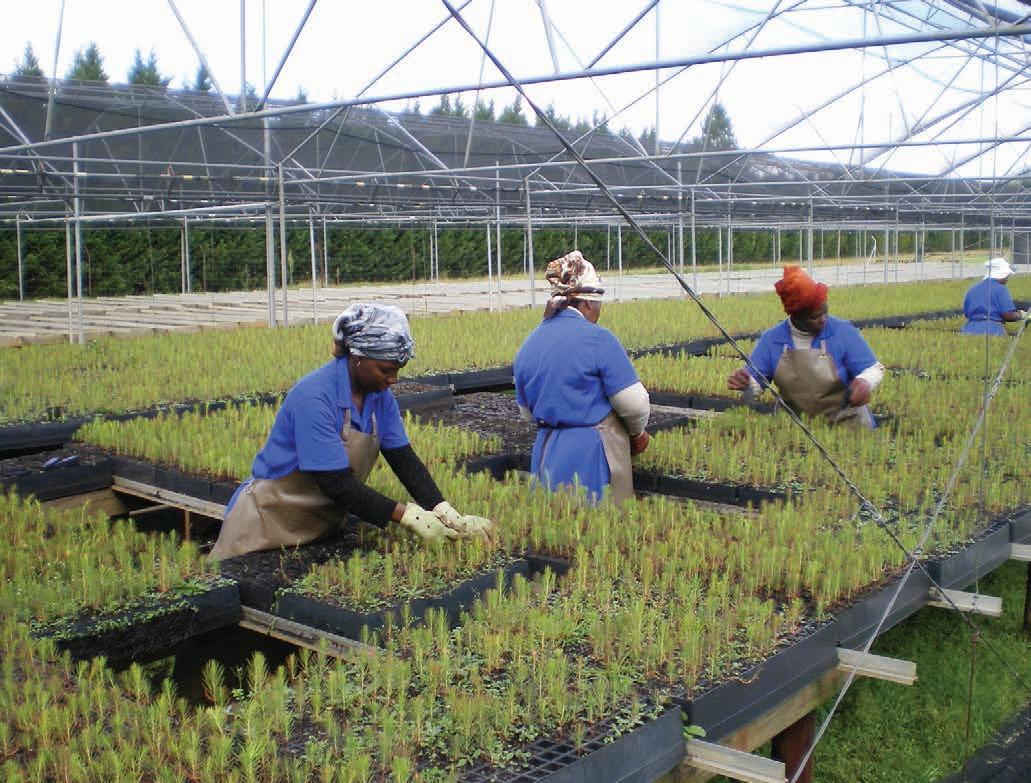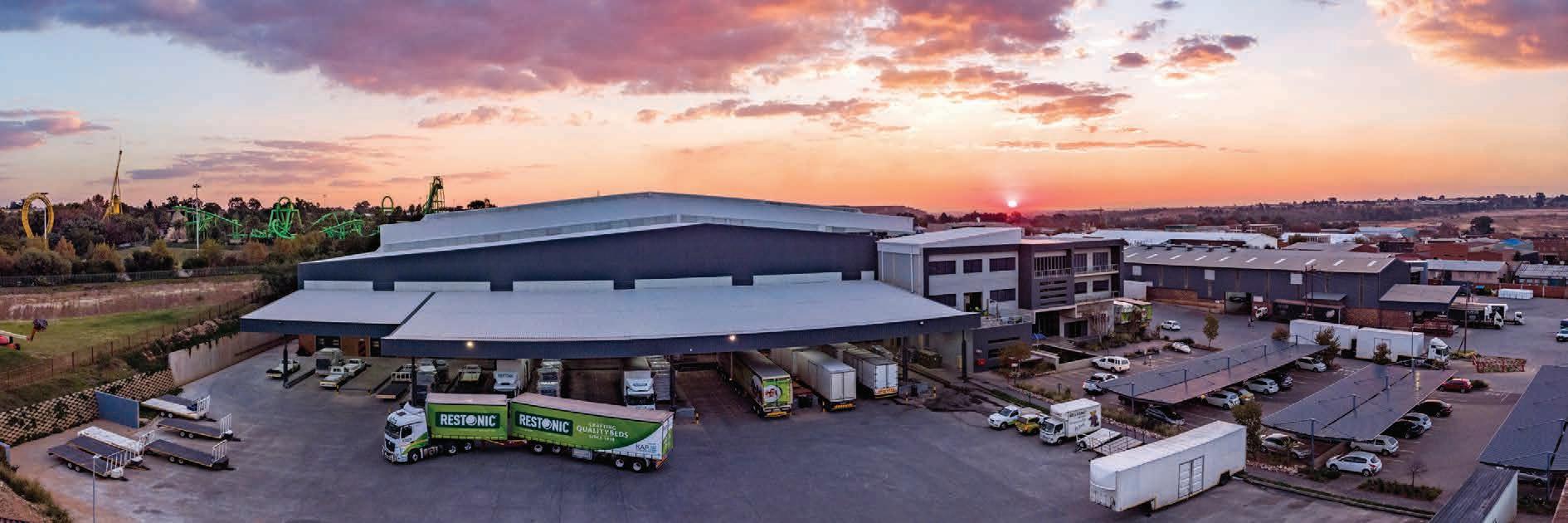
12 minute read
POLYMERS
Plastic fantastic?
Globally, countries are declaring war on plastic. What does that mean for the polymer industry? TREVOR CRIGHTON investigates
There is a big sentiment that plastic does not belong in the environment, says Safripol CEO Nico van Niekerk. “As a polymer producer, we agree wholeheartedly. Yes, there is a problem. Yes, we all need to take action immediately and consistently. But plastic isn’t the problem; pollution, littering and dumping are the problem. That is where the focus of the ‘war on plastic’ should lie.”
Anton Hanekom, executive director of Plastics SA, says that for the past fi ve years the industry has been focusing its efforts on developing circular economies within South Africa. “In a circular economy, there is no waste. When a person has fi nished with something, it becomes the raw material for something else.”
We’ve adapted our soft drinks to local palates POLYMERS AREN’T JUST FOR PLASTIC PACKAGING
and taste preferences.” In South Africa, plastics packaging – LISLE CLARK, CEO, TWIZZA accounts for 49 per cent of the local market followed by building and construction at 13 per cent and agriculture at 10 per cent. Textiles in the form of synthetics such as polyester consume 47 million tonnes of plastics annually. Consumer and institutional products that encompass everyday goods such as bins, input for appliances such as laptops and TVs, furniture and so forth utilise 42 million tonnes of plastic while transportation consumes 27 million tonnes. Electronics, largely in the form of insulation for electric wires, consume 18 million tonnes, and industrial machinery uses 3 million tonnes.
Source: Plastics SA

RESPONSIBLE PLASTIC DID YOU KNOW?
Safripol splits plastics into two categories: 503 600 tonnes of plastics waste responsible and irresponsible plastic. The (45.7 per cent of all the plastic produced former is any plastic that is used, handled and in South Africa) was collected for managed responsibly, leading to repurposing, recycling in 2019. Of this, more than reuse, recycling or the correct and safe half (362 800 tonnes) was packaging. disposal. The latter is that which is not used, Source: Plastics SA handled or managed responsibly, leading to overpackaging, a lack of recycling, and bioplastics are not just one single material, dumping and pollution. “For some time now, but comprise a whole family of materials with we have been disinvesting in partnerships and different properties and applications. “A plastic products that we feel are damaging material is defi ned as a bioplastic if it is to the environment, have a either bio-based, biodegradable, better alternative, or are or features both properties,” he unnecessary,” says FAST FACT says. “Bio-based polymers Van Niekerk. Safripol views the pressure to make the plastics industry more sustainable and environmentally friendly In 2019, 1 842 745 tonnes of polymer (locally produced, imported and recycled) was converted into plastics products – are similar to petro-based polymers except the monomeric units are derived from plant-based materials, rather than fossil fuels.” as an opportunity rather 18 per cent of these locally Van Niekerk believes than a challenge. “The converted polymers came the term is misunderstood whole industry is taking from recycled material. in South Africa, and many ‘responsible plastic’ very Source: Plastics SA different types of plastics are seriously,” says Van Niekerk, incorrectly bundled under the “from the initial design of products “biodegradable” banner. “If those to individual commitments to reduce, plastics were properly repurposed, recycle and reuse. Plastic is one of the most reused, recycled or disposed of correctly, they recyclable materials and plastic waste has wouldn’t end up in landfi lls and the environment a value. Collected and recycled, plastic can in the fi rst place. We should be talking about create employment biopolymers as opposed to biodegrading.” and stimulate Safripol believes there is going to be the economy.” substantial growth in recycling and innovative projects to reduce plastic in design and BIO BUGBEARS reuse and repurpose plastic waste into Regarding growing new products. “We also believe people will calls for the use of start taking greater responsibility for recycling more biodegradable at home and that there will be a reduction in plastics in the litter, pollution and dumping – that’s what Nico industry, Hanekom we all want for the environment,” says van Niekerk explains that Van Niekerk.
– NICO VAN NIEKERK, CEO, SAFRIPOL


Sustainability is core to PG Bison. It plants more than 4.7million trees per annum.

KAP: INTEGRATED INTO EVERYDAY LIVING
With business operations spanning half a dozen sectors, KAP truly is integrated into our everyday lives
KAP Industrial Holdings Limited (KAP) is a diversified group consisting of leading industrial, chemical and logistics businesses. Listed on the JSE, the group offers investors access to market-leading businesses with strong brands, supplying nondiscretionary goods and services across several industries.
KAP’s purpose as a group is to build exceptional businesses that create unique opportunities and accelerate sustainability. To do so, the group strives to identify markets with growth potential and then become the leader in those markets by creating innovative strategies that offer value-added solutions to its customers. To grow and maintain a competitive advantage, KAP continuously invests in its brands, products and services, and through a combination of innovation, scale, backward integration, channels to market, technology and market share protects margins and revenues in the long run. Operations are guided by the dual belief that the best product always wins and the cheapest producer always wins – this philosophy is a driver of relentless innovation in solutions and processes.
A key tenet of KAP’s strategy is maintaining earnings sustainability through diversification. The group comprises marketleading businesses – servicing various sectors including construction, automotive, furniture, logistics, food, agriculture, mining and recycling – across a range of geographic regions and growth sectors, ensuring consistent revenue regardless of the vagaries of the market. This approach creates opportunities for investors to invest in companies and sectors they may typically struggle to gain access to while spreading their risk across a variety of territories, industries and markets – a win-win.
As an African company, KAP is focused on growing markets on the continent and sees its proximity to these markets as an advantage over global competitors. Africa is a region of growth: in population, development and investment. KAP’s interests in its various sectors ensure it is positioned to take advantage of the growth and development across Southern Africa.
Of course, investing in innovative products, solutions and processes is meaningless without investment in the right people. The group’s culture recognises how crucial attracting and retaining the right people is for realising its vision, and these people – industry leaders as diverse as its businesses – form the heart of the group. KAP achieves a decentralised management structure by empowering and trusting its leadership to execute its mandate in their respective sectors. This engenders the agility necessary to adapt and thrive in today’s ever more dynamic and constantly changing world.
As a market leader, KAP also recognises the responsibility that comes with that position and remains committed to responsible corporate citizenship, directing the company’s social responsibility to projects involving the youth that enhance education, nutrition and community development. Projects include the creation of sustainable feeding schemes, teacher education and learnership programmes for interns and apprentices including learners with disabilities.
PG BISON
Established more than 120 years ago, PG Bison is the leading wood-based panel supplier in Africa. The integrated timber business, which has its own sustainably managed forests and primary timber processing plant for making structural timber and poles, services the retail, construction, furniture manufacturing and residential development market in Southern and East Africa and Australia with leading branded wood panels and decorative products.
With revenue over R3-billion, PG Bison ensures its long-term sustainability by its investments in plantations – where more than 4.7 million trees are planted every year – and its manufacturing of resin and upgraded paper. In fact, such is KAP’s confidence in the sustainability and growth of PG Bison and the timber sector that it recently announced a R2-billion investment in the division. “These expansion projects, employing the latest technology, will significantly improve PG Bison’s global competitiveness and position the company for further growth in both local and export markets,” says KAP CEO Gary Chaplin.

Restonic has the largest matttress manufacturing footprint in Southern Africa.

Restonic manufacture all their own bedding components. Safripol is the only manufacturer of PET and HDPE in South Africa.

Safripol utilises the latest technology to drive manufacturing efficiencies.

FELTEX
The Automotive Components division manufactures a wide range of components used in the assembly of new motor vehicles under the Feltex banner, with 15 manufacturing plants supplying moulded foam seats, insulation, acoustic and thermal components, among others, to all the major original equipment manufacturers (OEMs) in South Africa. Feltex plants are strategically located close to the OEM assembly plants, providing an advantage in terms of “just in time” and “just in sequence” supply – crucial in today’s increasingly on-demand consumer model.
As a level 4 B-BBEE company, Feltex is also well-positioned to take advantage of the recently revised Automotive Production and Development Programme, which incentivises OEMs to increase procurement from local, black-empowered suppliers.
The division also produces after-market accessories under the Maxe banner, including nudge bars, rear styling bars and side steps for light commercial vehicles, sports utility vehicles and heavy commercial vehicles.
RESTONIC
With a history stretching back more than 70 years, Restonic notably has the largest mattress manufacturing footprint in Southern Africa and is the only fully vertically integrated national manufacturer of mattresses, supplying more than 700 000 units under house brands for retail customers as well as its brands like Green Coil and Restonic.
With five production hubs across South Africa and Namibia, the Integrated Bedding division comprises Restonic, Deslee Mattex, Vitafoam, Vitatex and Connacher, manufacturing everything from flexible polyurethane foam, rebonded foam, expanded polyethylene and knitted and woven fabrics to nonwoven textiles, springs, bed bases, mattresses and recycled textile products.
SAFRIPOL
With revenue over R7-billion, Safripol produces polymers used in applications ranging from piping, multipurpose containers, fibres and films to textiles, nonwoven fabrics, packaging and bottling.
Safripol is committed to a sustainable plastics industry and recently launched a campaign to encourage consumers to use plastic responsibly. Safripol splits plastic into two categories: responsible and irresponsible plastic. The former is plastic that is used and managed responsibly leading to repurposing, reuse, recycling or the correct safe disposal.
Unitrans passenger provides personnel transport to large corporate employers.

Unitrans operates across South Africa and in nine African countries.


The Unitrans Control Tower improves efficiencies and safety.
The latter is that which is managed irresponsibly leading to overpackaging, a lack of recycling, and dumping and pollution. Safripol’s focus is on developing polymers that support the responsible use of plastic.
Plastic waste has a value and when collected and recycled, plastic can create employment and stimulate the economy. Safripol, in partnership with PETCO, has provided funding to start up two recycling plants and conducts beach clean-ups in its own capacity with the assistance of employees.
UNITRANS
Unitrans Logistics – with revenue of R9-billion – consists of three operations, each with a specific focus on their respective markets.
Unitrans South Africa
Unitrans Supply Chain Solutions is a black-empowered transportation and logistics company with diversified operations in sectors including food, petroleum, chemicals, industrial products (such as cement), mining and general freight.
Unitrans recently established the Unitrans Centralised Control Tower (UCT), which utilises several technologies to monitor the safe and efficient movement of more than 2 500 vehicles. Tracking vehicles against defined route plans, the UCT helps to mitigate the risk of goods-in-transit theft and hijackings, ensures load integrity and increases operational efficiencies, fleet utilisation and customer service. Cutting-edge in-cab systems monitor driver fatigue and behaviour and pre-empt incidents, thereby reducing accidents.
Unitrans Africa
KAP’s logistics footprint covers more than just South Africa. Unitrans Africa’s fleet of over 1 400 vehicles services the general freight, agriculture and mining sectors across nine countries in sub-Saharan Africa.
The company has invested heavily in technological innovation in the agricultural field, enabling it to expand into the field of complementary farming services. Alongside trials of precision farming techniques, Unitrans has implemented drone surveying to conduct normalised difference vegetation index mapping. Analysing the data accumulated through this process can identify areas requiring additional irrigation or fertiliser. This allows for precise and variable application of fertilisers and agrochemicals, thereby improving crop yields and reducing costs for customers.
Looking to the future, the company sees potential in commodity freight on the continent and is in the process of expanding its inbound and outbound road freight services.
Unitrans Passenger
Unitrans Passenger’s key focus is the management of long-term commuter and personnel contracts for governmental and corporate organisations. It has contracts with several provincial governments to provide cost-effective, reliable and safe transport solutions to various municipalities and surrounding districts. Unitrans also operates the Gautrain bus feeder service on behalf of the Gautrain Management Agency.
On the corporate front, Unitrans provides transport to and from work for the employees of large corporates, making more than 1 270 trips per day. The burgeoning oil and gas sector in Mozambique has been a growth opportunity for the business to leverage its existing infrastructure in the region and introduce a personnel transport service offering to various customers in the north of the country.
The KAP group comprising diversified leading businesses operating across many sectors supplying nondiscretionary goods and services is well poised for growth on the African continent.

For more information:
+27 21 808 0900 investors@kap.co.za www.kap.co.za













